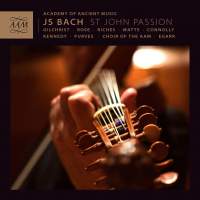Texte paru dans: / Appeared in:

Fanfare Magazine: 38:1 (09-10/2014)
Pour
s'abonner / Subscription information
Les abonnés à Fanfare Magazine ont accès aux archives du
magazine sur internet.
Subscribers to Fanfare Magazine have access to the archives of the magazine
on the net.
AAM Records
AAM002

Code-barres / Barcode
: 5060340150020
Consultez toutes les évaluations recensées pour ce cd
~~~~ Reach all the evaluations located for this CD
This has to be not only the weirdest performance of any Bach choral work I’ve ever heard in my life, but also the weirdest historically informed performance I’ve yet encountered on records. By now I’ve become used to many of these HIP performers’ wacko nutcase ideas about music, the one-to-a-part choral singing, the constant (and unvaried) straight tone in the strings, etc., etc. But this performance doesn’t even sound as if it’s being given by human beings. From the very start, the orchestra sounds more like a MIDI machine than usual, in fact it sounds like some of these electronic whining records I am sometimes unfortunate enough to have to review. You know, maybe this is why performers like Egarr do this kind of thing: They’re so used to electronic instruments that they want their early music to also sound like that. I suppose you can call it “Wendy Carlos Envy.”
In any case, as I say, the opening chorus sounds just plain weird, like something that dropped in from another planet: whining instruments and a chorus that sings Bach’s coruscating lines as if they were waveforms on a computer graph. Scrambling through Richard Egarr’s liner notes, all you find is that he spent a lot of time wondering if the flute was used in the original orchestra (wow, does this guy have too much time on his hands or what?). To quote what follows: “We are therefore forced to extrapolate backwards from the multi-layered later material, and look at the handful of parts that survive for this first version … and various bits of supposedly corroborating evidence (actually speculation) have been cited.” He eventually settled on just oboes, no flute. Translation into real English: I don’t know what the hell I’m doing, and I’m not sure that the bits that Bach left us provide a clue or not, so I just kind of made up my version as I went along, because let’s face it, who doesn’t want to hear a replication of the first performance? Well, Richard, my hand is raised, and I think perhaps most of the classroom’s hands, too. So just stop this nonsense, OK? Thank you.
Thankfully, the chorus sounds a bit more normal in their following entries, but the orchestra does not. Even the viola da gamba, bassoon, and organ sound like a MIDI behind the vocal soloists, who are mostly very good, although a bit whiny in their vocal inflections. More annoying to me than even the sheer sound of this weird, extra-terrestrial-sounding orchestra is their phrasing, which is emotionally neuter, clueless to the fact that this is an evolving passion drama. Say what you want (negative, of course) about Otto Klemperer’s recording of the St. Matthew Passion, it had heart and plenty of it. This performance has … well, I’m not quite sure what to call it. Perhaps “alien spunk” comes close. It sounds like a toned-down version of the alien creatures’ band in the Star Wars bar scene.
The
recording on Avie 2236, with soprano Shannon Mercer, tenor Charles Daniels,
baritone Joshua Hopkins, and the Portland Baroque Orchestra conducted by
violinist Monica Huggett, is at the moment the finest performance of this
work I have heard. If, however, you like Baroque music to sound as if it is
played by MIDIs, you are free to enjoy this one, too.
Cliquez l'un ou l'autre
bouton pour découvrir bien d'autres critiques de CD
Click either button for many other reviews


